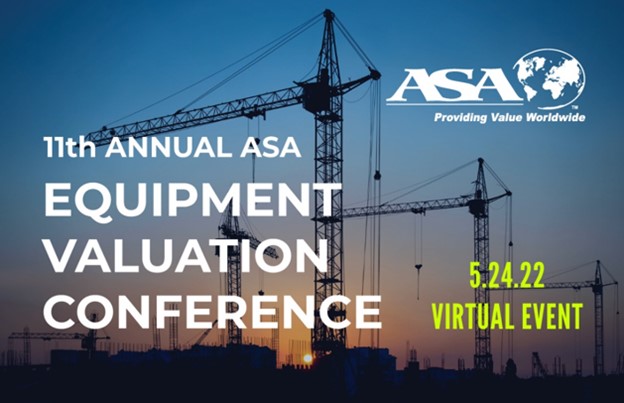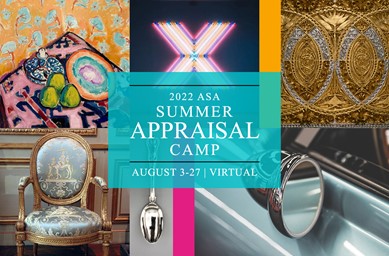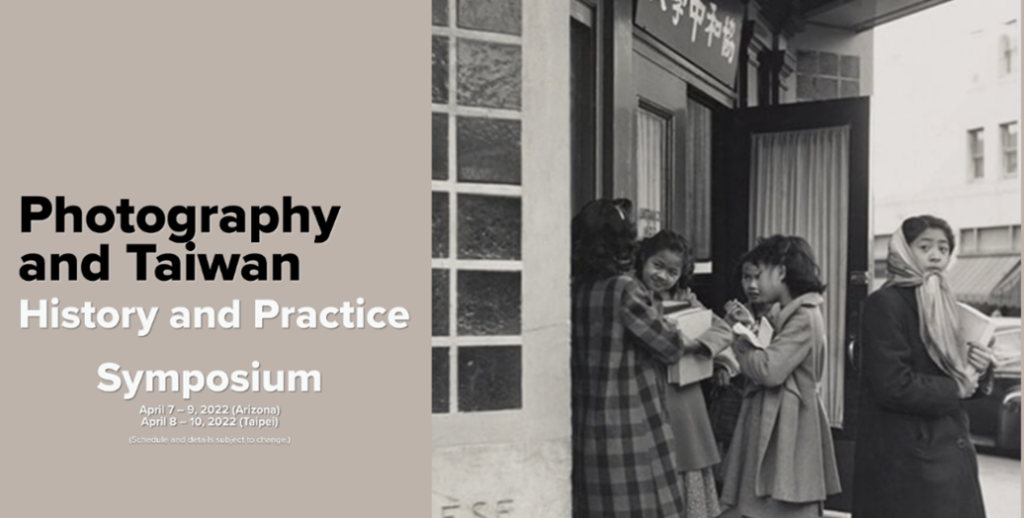CAA News Today
Global Conversations: Materiality and Mediation
posted by CAA — Sep 27, 2022
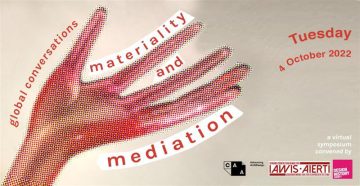
We are excited to introduce the presenters for the virtual symposium, Global Conversations: Materiality and Mediation, on October 4, 2022 from 11 am to 1 pm Eastern time. The event is organized by the College Art Association (CAA) and two of its international affiliated societies, the Design History Society and the International Association of Word and Image Studies. To register for the event, visit this page.
This global collaborative project brings together three intersecting constituencies—art and design, design history, word, and image studies—to examine how materiality and mediation intersect.
Four participating scholars will present on the following topics, followed by Q&A and discussion. The event will be recorded and shared online following the event.
This no-cost event is open to the public. Please consider donating to support no-cost programming and providing access to new and emerging scholarship.
CAA’s membership program connects you to the largest community of individuals and organizations working together and advocating to advance research, practice, and the impact of the visual arts. Visit our website for more information and to join our organization.
Questions? Email info@collegeart.org.
Interested in becoming an affiliate?
Arts organizations interested in joining CAA as an affiliated society can do so by visiting our website.
To join the Design History Society, please visit this page.
To join the International Association of Word and Image Studies, please visit this page.
Global Conversations: Materiality and Mediation
Presentations and Panelists
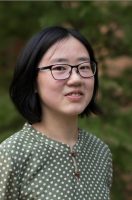
“Tavolino di gioie”: The Mediation of Material Techniques in Late Cinquecento Hardstone Inlaid Tables – Wenyi Qian, Ph.D. Candidate in Art History, University of Toronto, Toronto
Wenyi Qian is a Ph.D. candidate in early modern Italian art, with a focus on the relationship between artistic practice and knowledge culture of the period. Her dissertation examines the production of hardstone inlaid tables in late Cinquecento and Seicento Italy at the nexus of early modern craft knowledge, natural sciences, and courtly life and consumption. It aims to track technical crossovers between disparate artistic media and scales in the making of this genre of domestic furniture. She holds a BA in History of Art with Material Studies and an MA in History of Art from University College London. Prior to her doctoral research, she interned at the Museum of Fine Arts, Houston, and worked as a convenor of academic programs at OCAT Institute, Beijing. This latter experience led to her interest in the historical formation of the discipline in Europe, as well as transnational intellectual exchange around the ideas of the arts and humanities across Europe, America, and East Asia over the last century. In addition to academic research, her translation of Victor I. Stoichita’s L’Instauration du tableau: métapeinture à l’aube des temps modernes is forthcoming by the end of 2022.
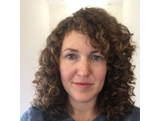
Mediating the Meaning of Textiles through Exhibition Displays in Israel, 1950s-1970s – Noga Bernstein, Marie-Sklodowska Curie Visiting Researcher, Hebrew University of Jerusalem
Noga Bernstein is an art and design historian, specializing in modern craft in the United States and Israel, with a particular focus on textiles. She is currently a visiting researcher at the Hebrew University in Jerusalem. Her current research project, funded by a Marie Sklodowska-Curie Fellowship, investigates the history of textile art and design in Israel between the 1940s-1990s. She also works on a book manuscript on the US-textile design Ruth Reeves. Dr. Bernstein is a recipient of grants from the Smithsonian Institution, the American Council of American Art and the Center for Craft. She completed her PhD in art history at Stony Brook University in 2019.
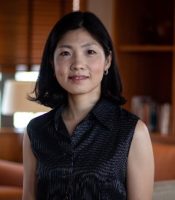

Made in Japan: Development of the Poster Medium in Japanese Commercial Art and Design – Nozomi Naoi, Associate Professor of Humanities, Yale-NUS College, Singapore
Erin Schoneveld, Associate Professor of East Asian Languages and Cultures and Director of Visual Studies, Haverford College, Haverford, Pennsylvania
Nozomi Naoi is Associate Professor of Humanities at Yale-NUS College with joint appointment at the Department of Japanese Studies, Faculty of Arts and Social Sciences at the National University of Singapore. She specializes in modern Japanese art and the media environment and is the author of Yumeji Modern: Designing the Everyday in Twentieth-Century Japan (University of Washington Press, 2020; awarded the Honorable Mention for the John Whitney Hall Prize 2022). Her current project focuses on Japanese poster design and the role of department stores, designers, and global modernism during the early twentieth century and she is currently preparing her second book manuscript titled: Modern Design and the Japanese Department Store: Visualizing the New Lifestyle. She is also co-curating an exhibition on postwar Japanese posters at the Poster House Museum in New York, opening in March 2023.
Erin Schoneveld is Associate Professor of East Asian Languages and Cultures; and Associate Professor and Director of Visual Studies at Haverford College. Schoneveld’s scholarship and teaching engages with modern and contemporary Japanese art, cinema, and visual culture. Her book Shirakaba and Japanese Modernism: Art Magazines, Artistic Collectives, and the Early Avant-garde (Brill 2019) provides a critical framework for understanding the tensions between the local and the universal that accompanied the global development of modernism. Schoneveld’s current book project Naomi Kawase and the Future of Japanese Cinema examines the role of Japanese women directors within national and world cinema cultures by evaluating Kawase’s auteur status at the intersection of film history, reception theory, gender, and identity. Schoneveld is also co-curating an exhibition on twentieth century Japanese poster art and design at the Poster House Museum in New York, opening in March 2023.
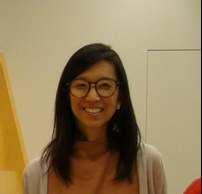
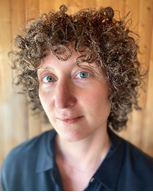
Mine Craft: Design Histories of Mining – Ellen Huang, Associate Professor of Art and Design History, ArtCenter College of Design, Pasadena, California
Arden Stern, Assistant Professor of Humanities and Sciences, ArtCenter College of Design, Pasadena, CA
Ellen Huang, Ph.D. is a historian of material culture, art, and technology at ArtCenter College of Design (Pasadena, CA, USA). In addition to teaching and research, Huang is also a curator, having organized exhibitions through universities such as the Ackland Museum of Art (UNC Chapel Hill), University of San Francisco and the Cantor Arts Center at Stanford University, as well as for civic museums. Huang is finishing a manuscript about Jingdezhen porcelain as material design in late-imperial Chinese and global history. Huang has contributed to publications for museums, journalistic forums, and academic journals, including Archives of Asian Art, Journal of World History, Art&Object, Jewels in Buddhist Imaginaries (University of Hawai’i Press), the National Museum of Korea Research Series, and Oxford Bibliographies.
Arden Stern, Ph.D. is a design historian whose scholarship focuses on the intersecting histories of US labor, graphic design, and visual culture. They are currently an Assistant Professor of Humanities & Sciences at ArtCenter College of Design (Pasadena, CA, USA), also teaching in the Media Design Practices program, and have served as Visiting Faculty in the Department of Anthropology at Wayne State University. They have contributed to various scholarly and journalistic publications, including the Design & Culture journal, Design Issues, and Print magazine, and are currently working on a manuscript that analyzes labor and class histories of graphic design in the United States from the late nineteenth century through the present.
CAA-Getty International Program 2023: Applications now open!
posted by CAA — Jul 06, 2022
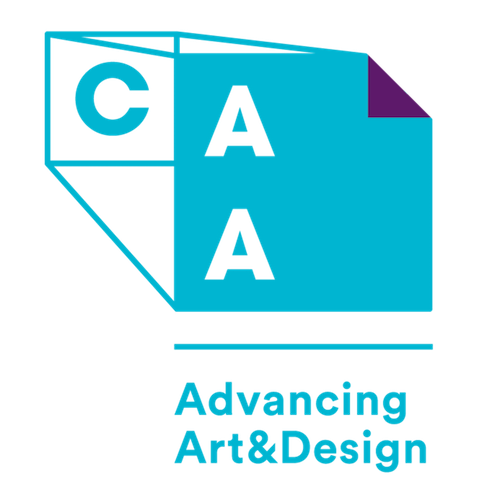
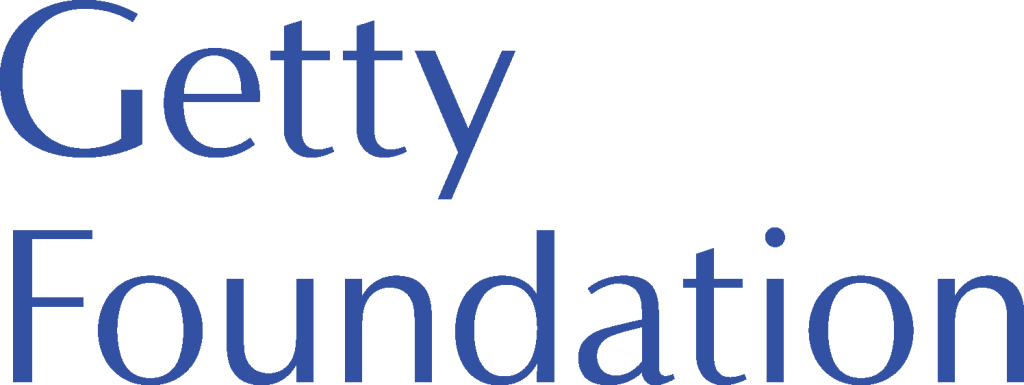
The Getty Foundation has awarded the College Art Association (CAA) a grant to fund the CAA-Getty International Program for a twelfth consecutive year. The Foundation’s support will enable CAA to bring twelve international visual-arts professionals to the 111th Annual Conference, taking place New York, NY, February 15–18, 2023. These individuals will be first-time participants in the program and will be accompanied by alumni of the program returning to present papers during the conference.
Participants will receive funds for travel expenses, hotel accommodations, per diems, conference registrations, and one-year CAA memberships. We encourage all international art historians, art history educators, and museum curators to apply. The program will also include a one-day preconference colloquium on international issues in art history on Tuesday, February 14, as well as ongoing engagement with other alumni from the program online and at future conferences. The deadline for applications is August 15, 2022. Guidelines and application can be found here.
Last year, CAA organized a publication to celebrate ten successful years of the CAA-Getty International Program. The publication, entitled Global Conversations: 10 Years of the CAA-Getty International Program features in-depth accounts of the program, a timeline of important events and milestones, and directories of past papers, members, and meetings.
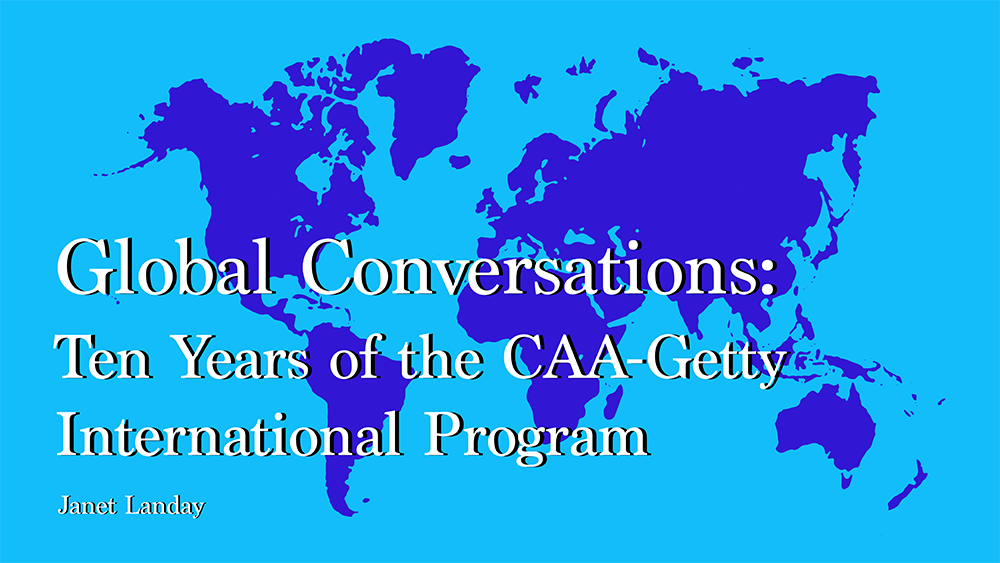
The CAA-Getty International Program was established to increase international participation in CAA and the CAA Annual Conference. The program fosters collaborations between North American art historians, artists, and curators and their international colleagues and introduces visual arts professionals to the unique environments and contexts of practices in different countries.
Since it began in 2012, the program has brought 147 scholars to the conferences, from over 50 countries located in Central and Eastern Europe, Asia, Southeast Asia, Africa, the Caribbean, and Central and South America. Each year, a preconference colloquium on international topics in art history inaugurates the week, kicking off four days of conference sessions, meetings with new colleagues, and visits to museums and galleries. Subsequent to these events, the program has generated many scholarly collaborations, including publications, conferences, and exhibitions.
Most of all, former grant recipients have become ambassadors of CAA in their countries, sharing knowledge gained at the Annual Conference with their colleagues at home. Past recipients have said that “variety of topics presented also exposed me to the realization that there is so much to be done to unearth the hidden treasures of global art history, which hitherto I have overlooked in my discipline and nation but which will now form the basis of my future projects,” and “the direct contact with other global south researchers is an unique occasion, rarely possible and extremely enriching.”
Meet the Spring 2022 Millard Meiss Publication Fund Grant Recipients
posted by CAA — May 25, 2022
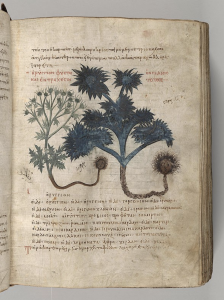
Depiction of eryngoes, De materia medica, MS M 652, f. 57r., The Morgan Library & Museum (relates to Griebeler, Botanical Icons: Critical Practices of Illustration in the Premodern Mediterranean)
MEET THE GRANTEES
Twice a year, CAA awards grants through the Millard Meiss Publication Fund to support book-length scholarly manuscripts in the history of art, visual studies, and related subjects that have been accepted by a publisher on their merits, but cannot be published in the most desirable form without a subsidy.
Thanks to the generous bequest of the late Prof. Millard Meiss, CAA began awarding these publishing grants in 1975.
SPRING 2022 GRANTEES
Claudia Calirman, Dissident Bodies: Brazilian Women Artists, (1960s-2020s), Duke University Press
Karen Mary Davalos and Tatiana Reinoza, Self Help Graphics at Fifty: A Cornerstone of Latinx Art and Collaborative Artmaking, University of California Press
Andrew Griebeler, Botanical Icons: Critical Practices of Illustration in the Premodern Mediterranean, University of Chicago Press
Joan Kee, The Geometries of Afro Asia: Art beyond Solidarity, University of California Press
Miriam Kienle, Queer Connections: Ray Johnson’s Correspondence Art Network, University of Minnesota Press
Murad Mumtaz, Faces of God: Images of Muslim Devotion in Indian Painting, Brill
CAA signs on to letter to EPA protesting closure of online archive
posted by CAA — May 05, 2022
The College Art Association has signed onto a letter from the American Society for Environmental History directed to the EPA in protest of the agency’s decision to retire its online archive. The text of the full letter is provided below.
—
The Honorable Michael Regan
Administrator
Environmental Protection Agency
1200 Pennsylvania Ave. NW
Washington, DC 20460
michael.regan@epa.gov
Re:
Dear Administrator Regan,
We the undersigned write to express our opposition to EPA’s plan announced in February to sunset its online archive in July 2022. The vast majority of our government’s interaction with the public comes through digital channels; public digital archives such as the EPA’s are of enormous value to historians as well as to the public.
This EPA archive has already proven immensely useful to environmental historians. Not only are citations to it regularly featured in traditional scholarly venues, it has greatly facilitated projects such as “A People’s EPA”, a website and Twitter feed through which historians help explain the work of the EPA to a broader public.
Not just historians but those from a variety of academic disciplines as well as the public rely on the EPA digital archive for information, insight, and analysis. The site has provided resources for others working in ecology, biology, toxicology, and other environmental sciences as well as geography, law, sociology, political science, and public health. Professors and teachers at various levels, from K-12 schools to the graduate level utilize the archive as a pedagogical resource, directing students to pages that offer authoritative records of the geographies they are exploring. Not least among those who have relied on the EPA’s online archive are those working with and living in more marginalized or environmental justice communities, a stated priority of current EPA leadership.
Having easily accessible documentation of the extensive EPA’s investigations and records of decision for Camp Lejeune, North Carolina, for instance, has helped overcome local doubts about the agency’s effectiveness, yielded greater understanding of chemical exposures, and otherwise significantly supported the agency’s efforts at clean-up. Here and elsewhere, residents faced with a potential environmental hazard can more easily access the agency’s past work in their locale as an aid to understanding prior investigations at the site.
The importance of EPA’s online archive is perhaps best illuminated by considering what will be lost when this archive is taken down. The many mentioned uses of EPA documents will become much more difficult for those who cannot travel to EPA’s print collections, and with any pandemic recurrence, well-nigh impossible. A tremendous gap will also open up in what more recent historical records are accessible, as it takes many years for any preserved documents to be transferred to and made available through the National Archives. It will become much more difficult for historians to assess and interpret this agency’s recent past, much less to situate it within longer histories and larger contexts.
We understand that the EPA’s provision of a public archive of its own documents and deliberations is voluntary and that online maintenance entails some costs. But those need to be factored against the better and broader understanding it has nourished of the vital work done by this federal agency, whose own future hinges on greater public awareness of and support for what it does. Instead of doing away with the EPA archive, the Biden administration should promote it as a model for other parts of the Executive Branch. In our digital age, agencies should make their own publications and other public interactions more quickly, thoroughly, and durably accessible, both to historians and to the larger publics our government serves.
Looking Back at a Year of Robust Humanities Advocacy
posted by CAA — Apr 25, 2022
By Alexandra Klein, National Humanities Alliance (NHA) Communications and Government Relations Manager
In early March, five months after Fiscal Year 2022 began, Congress finally passed a funding package for the year. The package included significant increases for federal humanities programs—most significantly, the largest increase we’ve seen in a decade for the National Endowment for the Humanities.
This success followed a full year of robust humanities advocacy, much of which was supported by scholarly societies such as CAA. For example, thanks to their ability to mobilize their members, we were able to recruit advocates from all 50 states to participate in our 2021 Humanities Advocacy Day, which kicked off our advocacy for these FY 22 wins.
In addition to many other engagements with members of Congress and their staff throughout the year, we followed Humanities Advocacy Day with two congressional briefings to highlight the impact of NEH funding.
The first briefing, held in September 2021, discussed NEH funding for diverse histories and civics in K–12 education. Since 2018, NHA has worked with over 20 NEH-funded professional development programs for K-12 educators to survey their impacts, and this briefing was an opportunity for congressional staff to hear about the data we’ve collected. At the briefing, we shared that 100 percent of respondents to a post-program survey reported experiencing professional growth as a result of the program they attended and 98 percent of respondents said they would recommend participating in an NEH workshop to a colleague. Staffers also heard directly from project directors about how these programs—which covered a range of topics including Native American histories, the Mississippi Delta, the Transcontinental Railroad, and Japanese American internment—offer crucial professional development to our nation’s educators, illuminate diverse histories, and support civic education in our nation’s classrooms.
The second briefing, held in November 2021, showcased how NEH funding for public humanities discussions enriches our communities by highlighting the example of the NEH-funded “Freedom Stories: Unearthing the Black Heritage of Appalachia the International Storytelling Center (ISC) in Jonesborough, Tennessee. Those involved in the project spoke about how it built space for dialogue and learning, and about how the discussions offered participants the chance to explore our rich histories and come together across differences. Thanks to a partnership with NHA to document the impact of the program, we were able to highlight that 82 percent of participants in the “Freedom Stories” program agreed that they “feel more confident taking part in thoughtful discussions about race” as a result of the program, and 93 percent felt motivated to “listen to the stories of people whose backgrounds are different from [their] own.”
After a long year of advocacy and several continuing resolutions that kept government funding at FY 21 levels past the beginning of FY 22, we were particularly pleased to see Congress approve a $12.5 million funding increase for the NEH in March, bringing its FY 22 budget to $180 million.
Our other priorities also saw increases. These included an increase of $2.5 million for Title VI, which brought its funding to $71.9 million, and an increase of $1 million for Fulbright-Hays, which brought its funding to $9.8 million. The Institute of Museum and Library Services received $268 million, an $11 million increase for the agency overall. While there was an increase for both the Office of Museum Services and the administration budget, the funding to carry out the Library Services and Technology Act remained level. The National Archives and Records Administration received $388 million, an $11 million increase. And NHPRC received $7 million, a half a million dollar increase.
There was one disappointment that came with these numbers. Nearly across the board, these final numbers were significantly lower than the numbers that the House and Senate originally proposed for our priorities. This was, however, the case for nearly all domestic spending.
As we turn our attention to FY 2023, we are hopeful we can build on the level of support we saw in the initial FY 2022 bills to secure additional increases in the coming year. The FY 23 process is off to a good start with the administration proposing another round of robust increases for several humanities priorities, which we will be working to make a reality as Congress drafts its yearly appropriations bills.
Affiliated Society News: April
posted by CAA — Apr 11, 2022
Affiliated Society News shares the new and exciting things CAA’s affiliated organizations are working on including activities, awards, publications, conferences, and exhibitions.
Interested in becoming an Affiliated Society? Learn more here.
American Society of Appraisers
Publications
Valuing a Business, 6th Edition
The seminal book on business valuation is back and better than ever. Shannon Pratt’s Valuing a Business has been the go-to valuation guide for 40 years and has been updated with need-to-know information about taxes, financial reporting, compliance, and more. Valuing a Business is still the best resource on the market for both new and experienced business appraisers. This book fully covers the concepts of business valuation and provides detailed answers to virtually every question on the topic, from executive compensation and lost profits analysis to ESOP issues and valuation discounts.
Events
11th Annual ASA Equipment Valuation Conference
Tuesday, May 24, from 11 a.m. – 4:30 p.m.
Now in its 11th year, this annual event has grown to become the definitive source for appraisers, equipment management and finance professionals on the latest insights into equipment valuation. Instantly leverage knowledge gained on market trends and spotlighted asset sectors, as well as new contacts made, by incorporating into your practice areas or introducing to your team.
2022 ASA Summer Appraisal Camp
August 2022
Develop the skills you’ll need to build a career in appraising personal property such as fine and decorative art, antiques, vintage cars, furniture, coins, stamps, and more.
The program includes four virtual courses held over four weeks, including:
- PP201 – Introduction to Personal Property Valuation – August 3-6, 2022
- PP202 – Development of a Personal Property Appraisal: Research and Analysis – August 10-13, 2022
- PP203 – Communication of a Personal Property Appraisal: Report Writing – August 17-20, 2022
- PP204 – Personal Property Valuation: The Legal and Commercial Environments – August 24-27, 2022
Taiwanese Art History Association
Announcements / Events
PHOTOGRAPHY AND TAIWAN: History and Practice
Thursday, April 7
The Taiwan Academy of the Taipei Economic and Cultural Office in Los Angeles (TECO-LA), the University of Arizona’s School of the Arts (SAUA), and the Center for Creative Photography (CCP) are collaborating for the first time on the “Spotlight Taiwan project” to hold the “Photography and Taiwan: History and Practice” online symposium from April 7 to April 9, 2022 (PST). Nineteen scholars and experts from Korea, the United States, Australia and Taiwan are invited to attend the symposium. They will help the audience understand more about the history, culture and democratization of Taiwan through a historical lens and scholarly debate as recorded in the photography.
From Kyivan Rus’ to Modern Ukraine: Virtual Conversations on History, Art, and Cultural Heritage
posted by CAA — Apr 11, 2022
Ukraine’s history, art, and culture are endangered by the ongoing war. At Dumbarton Oaks, this lecture and conversation series by experts in the fields of history, art history, archaeology, heritage, sociology, as well as museums and conservation, among others, presents the region’s rich historical and cultural complexity through its objects, sites, and monuments. A focus on the medieval and early modern periods featuring Greek, Latin, and Slavic contacts, brings to the fore critical evidence to counter modern misrepresentations of Ukraine’s history and cultural heritage.
INAUGURAL LECTURE | FRIDAY 22 APRIL 2022 | 12:00 EDT [ 17:00 London | 18:00 Paris | 19:00 Kyiv ]
OLENKA Z. PEVNY (University of Cambridge)
“Lacunae of Art History and Kyiv’s Visual Culture”
Free and open to the public. Register for the inaugural lecture here. If you cannot attend but would like to receive future updates about this series of events, please join the mailing list here.
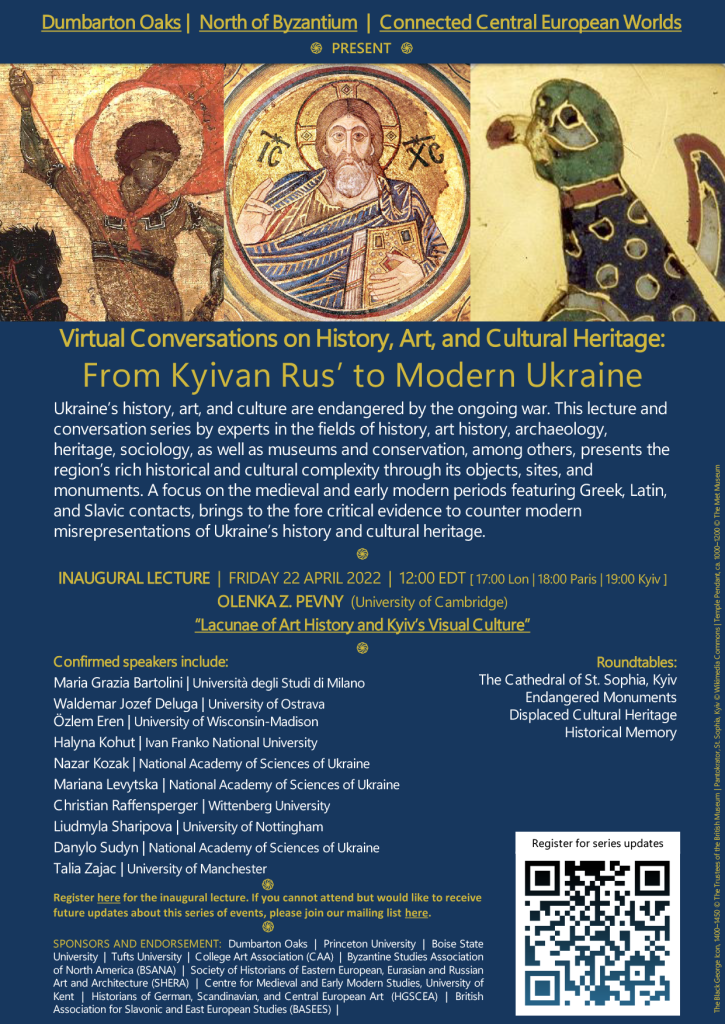
Future events include:
- May 2022 – Lecture: Mariana Levytska, National Academy of Sciences of Ukraine (The “Holy Rus’ concept” and Religious Art with Political Connotations (Pochaiv Monastery in 19th century)
- May 2022 – Discussion workshop on The Cathedral of St. Sophia, Kyiv
- June 2022 – Lecture: Christian Raffensperger, Wittenberg University (“Medieval Origins and Modern Constructs, Rus – Ukraine – Russia”)
- July 2022 – Lecture: Liudmyla Sharipova, University of Nottingham (Mazepa’s women before and after Poltava: to save and to keep)
- July 2022 – Discussion workshop on Endangered Monuments
- September 2022 – Lecture: Maria Grazia Bartolini, Università degli Studi di Milano (Reading the image of prince Volodymyr Sviatoslavych in seventeenth-century Kyiv)
- September 2022 – Discussion workshop on Displaced Cultural Heritage.
- October 2022 – Lecture: Nazar Kozak, Senior Research Scholar, Department of Art History, The Ethnology Institute, National Academy of Sciences of Ukraine Lviv (Images of Power and Their Discursive Site-Specificity in Kyivan Rus’)
- November 2022 – Lecture: Talia Zajac, University of Toronto (will speak about the marriages between the ruling clan of Rus’ and Latin Christian Europe or the translation and commentary on the eleventh-century prayerbook of Gertruda of Poland)
- November 2022 – Discussion workshop on historical memory.
- December 2022 – Lecture: Halyna Kohut, Associate Professor, Ivan Franko National University of Lviv (Taste, Social Class, and Oriental Carpet Design in the Eighteenth-Century Cossack Hetmanate)
SPONSORSHIP AND ENDORSEMENT:
- Dumbarton Oaks
- Princeton University
- Boise State University
- Tufts University
- Centre for Medieval and Early Modern Studies, University of Kent
- College Art Association (CAA)
- Byzantine Studies Association of North America (BSANA)
- British Association for Slavonic and East European Studies (BASEES)
- Historians of German, Scandinavian, and Central European Art (HGSCEA)
- Society of Historians of Eastern European, Eurasian and Russian Art and Architecture (SHERA)
Announcing the 2022 Terra Publication Grant Winners
posted by CAA — Mar 29, 2022
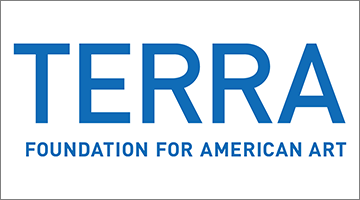
CAA is pleased to announce the 2022 recipients of the Terra Foundation for American Art International Publication Grant.
The Terra Foundation for American Art International Publication Grant supports book-length scholarly manuscripts in the history of American art, visual studies, and related subjects that are under contract with a publisher. The Terra Foundation supports projects that share expansive narratives of American art. Projects should focus primarily on visual art made before 1980.
The six grantees for 2022 are:
Isabelle Bonnet and Sophie Hacket, Casa Susanna, Editions Textuel
Betsy Boone, Spanish Element in Our Nationality: Spain and America at the World’s Fairs and Centennial Celebrations, 1876-1915, Centro de Estudios Europa Hispanica
Julia Bryan-Wilson, Louise Nevelson: Drag, Color, Join, Face, Yale University Press
Josh T. Franco, Marfa, Marfa: Minimalism, Rasquachismo, and Questioning Decolonial Aesthetics in Far West Texas, Duke University Press
Sophie Lynford, Painting Dissent: Art, Ethics, and the American Pre-Raphaelites, Princeton University Press
Andrew Witt, California in Catastrophe, MIT Press
CAA Signs On to Joint Statement of Opposition to Banning Scholars Based on Citizenship
posted by CAA — Mar 16, 2022
CAA has signed on to the Association for Slavic, East European, and Eurasian Studies (ASEEES) statement in opposition to banning scholars based on citizenship. CAA stands by its previous condemnation of Russia’s colonialist aggression and oppression of Ukraine. At the same time, we share concerns about calls for blanket bans on the participation of individual Russians and Belarusians in scholarly events and scholarly exchange. CAA believes that banning Russians and Belarusians based solely on their citizenship goes against our fundamental principles of scholarship, open communication, and dialogue. To read the statement in full, please visit their page.
Meet the 2021 Professional Development Fellows
posted by CAA — Feb 18, 2022
CAA is pleased to announce the recipients of the 2021 Professional Development Fellowships. The recipient of the $10,000 fellowship in visual arts is Christine Lee, California Institute of the Arts and the recipient of the $10,000 fellowship in art history is Jenny Tang, Yale University. An honorable mention in visual arts goes to Malene Barnett, Temple University and an honorable mention in art history goes to Maia Nichols, University of California, San Diego. All fellows and honorable mentions receive a complimentary one-year CAA membership and registration for the 2022 Annual Conference.
2021 PROFESSIONAL DEVELOPMENT FELLOWSHIP IN VISUAL ARTS
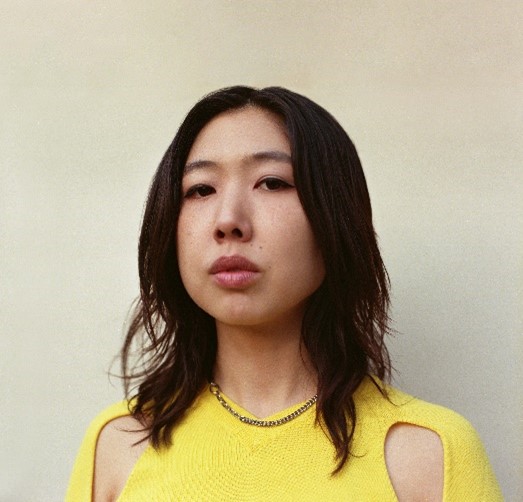
Christine Lee, California Institute of the Arts
Christine Yerie Lee is a visual artist primarily working in video, installation and sculpture. Raised in the American South by immigrant parents from South Korea, her practice explores performativity and identity-formation, often using the body to articulate ideas concerning resistance to hegemonic power structures in hopes to create a future yet to be imagined or narrativized. By engaging with folklore, history, and pop culture, her work addresses personal and collective memory, hybridity, and authenticity. Her material explorations reflect the poetics informed by these notions and are often activated in her digital works. Through intersectional inquiry and worldbuilding, she aims to illuminate the distinct and parallel threads of the human experience to provide pathways for connection. Lee received a BFA in Apparel Design from Rhode Island School of Design in 2010 and worked as a fashion designer for a decade prior to graduate school. She currently resides in Los Angeles and will complete her MFA in Art at California Institute of the Arts in May 2021.
HONORABLE MENTION IN VISUAL ARTS
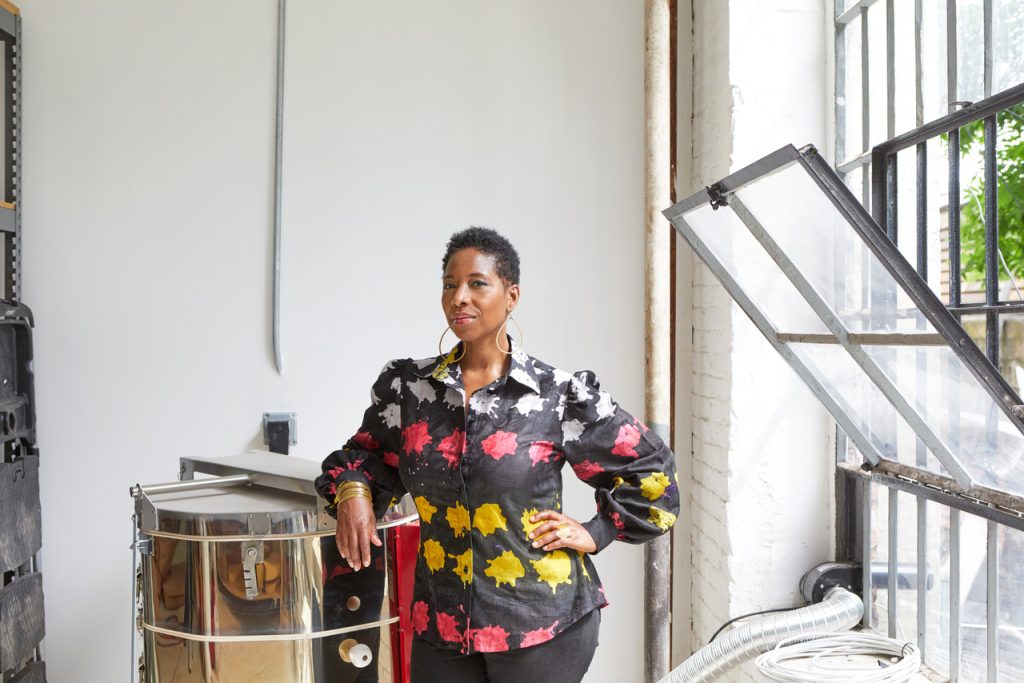
Malene Barnett, Temple University
Malene Barnett is a multi-disciplinary artist, entrepreneur, and authority on the cultural traditions and practices of art in the African diaspora and how it translates into her vision of the modern black experience. From her sculptural ceramic tiles and vessels to mixed media paintings to handwoven rugs, Barnett continues to evolve her craft and share her African heritage with a global audience. Using archival materials like glass, fiber and clay, she uncovers a deeper language of her legacy and an authentic understanding of her cultural identity. A passionate connector and expert ambassador, her mission is to use art as a tool to create community impact and open doors for the next generation of black artists and expand the conversation around marginalization in the arts and create greater opportunities for inclusion.
As the founder of the Black Artists + Designers Guild, a global platform and curated collective of independent black makers, she constantly seeks new ways to define the Black narrative and experience for a new generation while bringing awareness to inequality. Her work has been praised in Interior Design Magazine, New York Magazine, Traditional Home, Elle Decor, HGTV Magazine, Luxe + Design Magazine, and House Beautiful. She was also on the cover of Brownstoner Magazine and Wendy Goodman’s Designer Lives video series with New York Magazine’s The Cut. Her entrepreneurial spirit was captured in the NY Times bestselling book “In the Company of Women ” and Home by Hygge & West. She has appeared as a guest speaker on Morning Joe, MSNBC Your Business, and TEDx. Malene’s works have been exhibited at Museum of Science and Industry, Dallas African American Museum, Jane Hartsook Gallery, Mindy Solomon Gallery, Baltimore Clayworks, DAAP Galleries, and The Clay Studio.
2021 PROFESSIONAL DEVELOPMENT FELLOWSHIP IN ART HISTORY
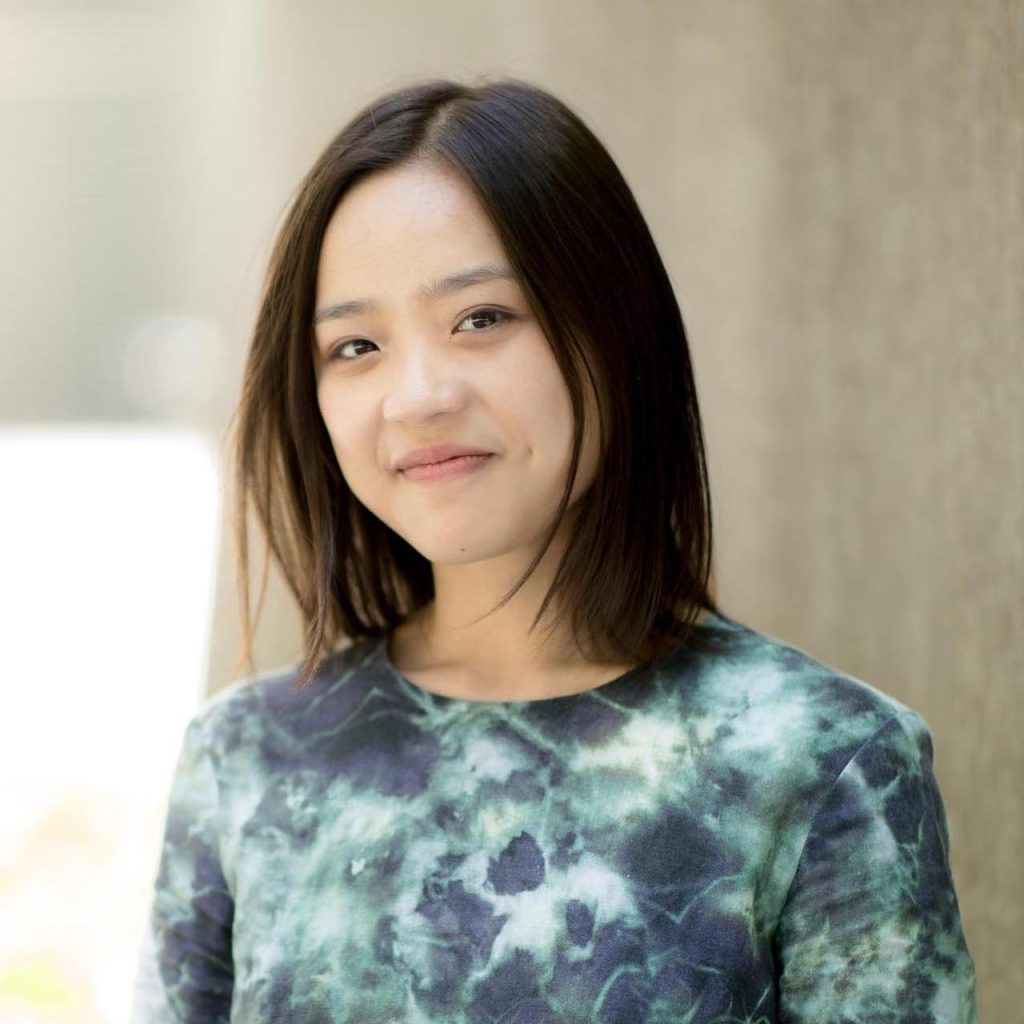
Jenny Tang is a doctoral candidate in History of Art and Film & Media Studies at Yale University, where she specializes in modern and contemporary art, media, and visual culture of the Atlantic world. Tang’s dissertation combines original archival research and a feminist postcolonial perspective to show how layered twentieth-century regimes of race and citizenship in the United States shaped modernist imaginations of the body across the Atlantic. From photomontage and abstraction to security and confinement, this work recasts the history of modernism through the lens of Asian American and African American racial formation. In addition to her scholarly practice, Tang writes criticism on the cultural politics of art, film, and music. She has also contributed to exhibitions and programs at the Studio Museum in Harlem and the Museum of Modern Art, where she was a 2020-21 Mellon-Marron Research Fellow in the Department of Painting and Sculpture. At Yale, she co-organized the group exhibition New Genealogies with photographer John Edmonds at the Yale School of Art. Tang currently teaches foundational topics in art history in the Department of Art History and the Rose Hill Honors Program at Fordham University.
HONORABLE MENTION IN ART HISTORY
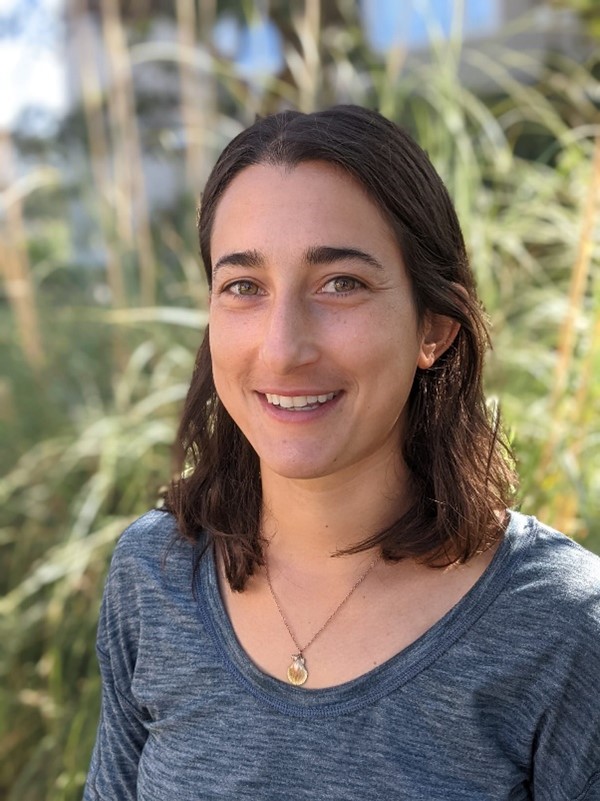
Maia Nichols, University of California, San Diego
Maia Nichols is a Lebanese American-Canadian doctoral candidate in art history, criticism and theory at University of California San Diego specializing in 20th century French and North African visual and material culture, postcolonial theory, and the history of social psychiatry. She holds degrees in psychology and visual art from the University of British Columbia in Vancouver and a masters in aesthetics and politics from the California Institute of the Arts. She additionally engages in art practice and has taught studio art drawing at UC San Diego. Her work has been exhibited internationally. Her art criticism has been published in venues such as Flash Art International, Hyperallergic, and Diagram. Her dissertation, researched in France with support from a four-year Canadian Social Sciences and Humanities Research Council Doctoral Fellowship, engages art historical visual and material culture methods and theories to consider the institutional history of French colonial North Africa’s progression to independence during the social psychiatry movement, drawing on a range of archival evidence of material culture and experience.
ABOUT THE PROFESSIONAL DEVELOPMENT FELLOWSHIP
CAA’s Professional Development Fellowship program supports promising artists and art historians who are enrolled in MFA and PhD programs nationwide. Awards are intended to help them with various aspects of their work, whether for job-search expenses or purchasing materials for the studio. CAA believes a grant of this kind, without contingencies, can best facilitate the transition between graduate studies and professional careers. The program is open to all eligible graduate students in the visual arts and art history. Applications for the 2022 fellowship cycle will be due December 15, 2022. Learn more.




